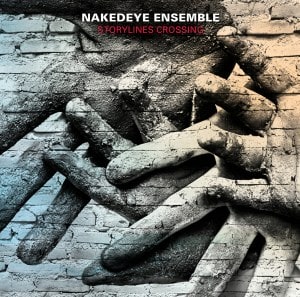The debut recording of the NakedEye Ensemble, “Storylines Crossing,” helps refute the notion that contemporary classical music is isolated from the world we live in. Three works have a sociopolitical slant, and several pieces draw on the energy that rock offers.
The pieces are inspired by a wide variety of subjects, including: the Vietnam War; the infamous Attica Prison riots; the development of a “groovy” bass line; and the antics of catnip-fueled cats. Five of the six works receive their premiere recordings, and the sixth work presents a new music masterpiece in a new, unusual arrangement.
Zack Browning’s Decade of the Dragon was written to mark the 50th anniversary of the beginning of the Vietnam War and the 40th anniversary of the end of that war. Strongly evoking the powerful emotions associated with the war, the piece features the rebellious sounds of a piercing, distorted electric guitar and driving drum set that effectively echo the countercultural rock music of the 1960s, which featured prominently in the anti-war protests at that time. Variations on a traditional Vietnamese tune also appear.
Randall Woolf’s first love was the blues, and he’s observed that a lot of music throughout the world sounds like the blues, with a commonality of wailing, driving rhythms, sliding notes, and rough percussive sounds. Punching The Clock uses bits of work songs from around the world, surrounded them with new harmonies and melodies, while juxtaposing and blending them, aiming for something new yet familiar to people everywhere. In the CD’s Introduction, Lainie Fefferman notes the piece “complements work songs from around the world with settings evoking actual work sounds: dry percussion hits, spiky high piano clusters, wailing guitar notes, chaotic bursts of ensemble writing. It’s easy to imagine these sampled songs in the context of the machines and environments that inspired them.”
Frederic Rzewski is well known as a composer of strong, leftist political convictions. He shatters structuralist convention but calls for social change with powerful use of folk songs, narratives, and politically charged texts. Rzewski’s masterpiece Coming Together was inspired by the 1971 riots at New York’s Attica prison and text from a letter written by an inmate, Sam Melville, who was killed in the riots. Less well known is that Melville was originally imprisoned for eight bombings in New York City, reflecting his opposition to the Vietnam War. In 2017, Attica’s dark history resurfaced in the news for its leprosy experiments on nonconsenting inmates.
Regarding this new arrangement, Fefferman comments, “The tapestry of different voices in Belcastro’s dynamic arrangement of Rzewski’s classic Coming Together unfolds here as a combination of all manner of whispers, screams, and monotone, taking advantage of studio mixing magic while bringing a sensibility of Marxist theater or community town hall meeting.”
As a refreshing contrast, the CD also offers three nonpolitical pieces.
Rusty Banks’ Surface Tensions deals with sonic viscosity, begins with quiet, scratching sounds, moves into a “gelatinous structure,” adds harder sounds that expand the “gooier” material, and at the end bursts forth with a powerful finish. “Banks’ Surface Tensions uses NakedEye’s instrumentation with lovely detail and freshness. Beginning with those deliciously close-miked scratching sounds of the piano, bass, and guitar, Banks sets you up to hear more traditional ensemble combinations with perky, open ears. Sometimes deploying rich, thick ensemble writing, sometimes giving ample space to chains of thin, dovetailing subsets of players, Surface Tensions is like a walk through a pleasant, variable city neighborhood on a brisk, breezy day” (Fefferman).
Jonathan Russell’s infectious Sextet began with a groovy little bass line that became the backbone of a dramatic and wide-ranging work. Fefferman writes, “Its licks and loops are jaunty and fun” and “Sextet fits nicely in the tradition of buoyant, toe-tapping post-minimalism – the punchy bass lines are just heavy enough to evoke rock energy, while the sparkling melodic lines tie into a smooth, well-crafted, chamber music tradition.”
Richard Belcastro’s Smoke n’ Wid was inspired by the playful, manic state of chaos when two cats found themselves in a large cardboard box, along with a pile of catnip. Fefferman describes the work as “an adorable four-minute valentine to his wife’s cats,” adding, “it’s tough not to smile imagining balls of fur tearing around a box.”
Regarding the overall CD and its title, NakedEye’s founder Ju-Ping Song comments, “Because members of the group come from diverse stylistic backgrounds, our music reflects the rock, jazz, experimental, and classical genres that define each musician separately. For us and for composers writing for us, this is a journey where storylines cross from the personal into the musical.”
The album was mastered by Grammy-winner Silas Brown.
About the Composers
Rusty Banks
Richard Belcastro
Zack Browning
Jonathan Russell
Frederic Rzewski
Randall Woolf
About NakedEye Ensemble
NakedEye Ensemble, whose concerts are “ear and mind opening experiences” (Lancaster Newspaper), commissions and performs new work by cross-over and cutting-edge composers. This eclectic eight-member electro-acoustic group with classical, rock, and jazz DNA presents music of the imagination. Based in Lancaster, PA, NakedEye Ensemble is led by pianist Ju-Ping Song.
NakedEye’s repertoire reflects the group’s mission to innovate and explore musical expression outside of convention. In addition to the composers on this CD, they have performed music by: Louis Andriessen, Luciano Berio, Martin Bresnick, John Cage, George Crumb, Donnacha Dennehy, Nick Didkovsky, Moritz Eggert, Florent Ghys, Phil Kline, Helmut Lachenmann, David Lang, John Mackey, Missy Mazzoli, Arvo Pärt, Caroline Shaw, Julia Wolfe, and Frank Zappa.







